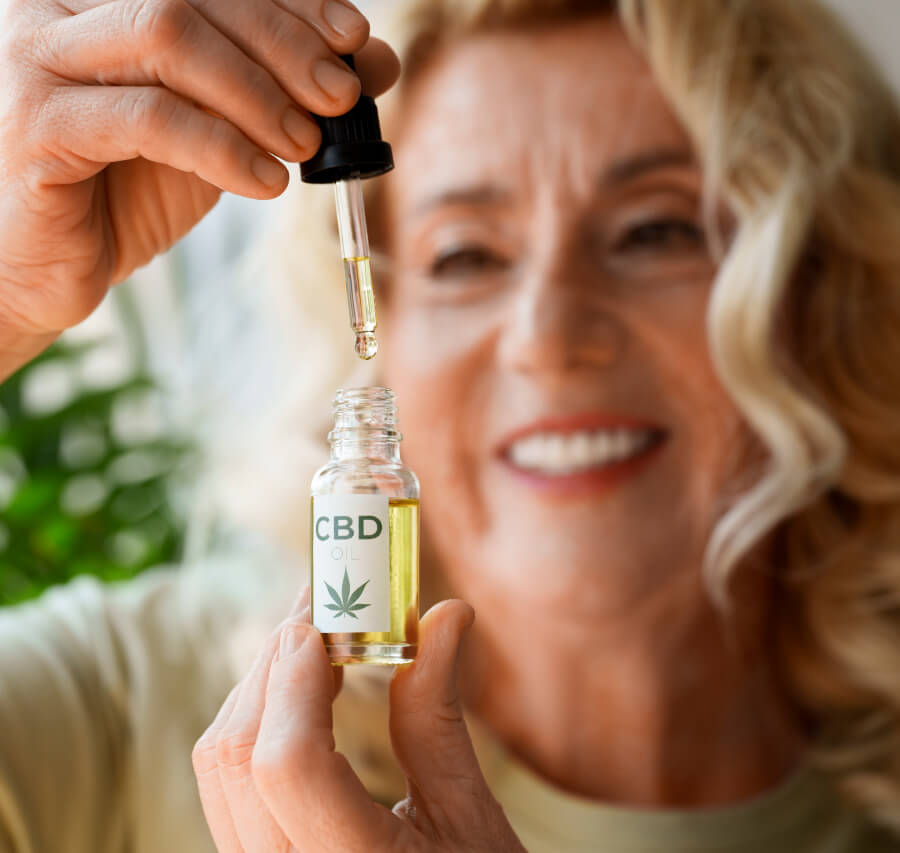If you are looking for a natural and effective way to improve your mood and balance your hormones, you may have heard of CBD.
CBD, or cannabidiol, is a compound derived from hemp and cannabis plants that has many health benefits, without causing any intoxication or addiction.
CBD can interact with your endocannabinoid system, which is a network of receptors and molecules that regulates various functions in your body, including mood, stress, sleep, appetite, inflammation, and pain.
CBD can also influence your endocrine system, which is a system of glands and hormones that controls your metabolism, reproduction, sexual function, and mood.
In this blog post, we will explore the top 5 uses of CBD for mood and hormones, and how CBD can help you with conditions such as anxiety, depression, PMS, menopause, and more.
What is CBD and how does it work?
CBD is one of the many cannabinoids, or chemical compounds, found in hemp and cannabis plants.
Unlike THC, the psychoactive component of cannabis that makes you feel high, CBD is non-intoxicating and has no addictive potential.
CBD works by interacting with the endocannabinoid system (ECS), a complex system of receptors and molecules that is present throughout the body and is involved in regulating various physiological and cognitive processes, such as:
- Pain
- Inflammation
- Appetite
- Memory
- Mood, and stress.
The ECS is also connected to the endocrine system, which produces and secretes hormones that influence many aspects of our health and well-being.
CBD can influence the ECS and the endocrine system in different ways, depending on the dose, the type of product, and the individual’s response.
CBD for mood can either stimulate or inhibit the activity of certain receptors and enzymes that affect the production and release of hormones.
CBD can also modulate the levels of neurotransmitters, such as serotonin and dopamine, that are involved in mood regulation and emotional stability.
By doing so, CBD for mood or hormones can help restore the balance and harmony of the hormones and the mood, and alleviate the symptoms of hormonal imbalances and mood disorders.
How can CBD help with hormonal balance?
Hormones are essential for every bodily function, but they can also cause a lot of problems when they are out of balance.
Hormonal imbalances can occur due to various factors, such as age, genetics, lifestyle, stress, disease, or medication.
Hormonal imbalances can affect both men and women, but women are more prone to experience them due to the natural fluctuations of hormones during the menstrual cycle, pregnancy, and menopause.
Some of the common signs and symptoms of CBD for Mood and Hormones:
- Weight gain or loss
- Fatigue or insomnia
- Mood swings or depression
- Anxiety or irritability
- Low libido or sexual dysfunction
- Hot flashes or night sweats
- Acne or skin problems
- Hair loss or excessive hair growth
- Irregular or painful periods
- Infertility or miscarriage
CBD for Mood and Hormones can help with hormonal balance by influencing the production and secretion of various hormones, such as
- Cortisol
- Insulin
- Melatonin
- Estrogen
- Progesterone
- Testosterone
Here are some of the ways CBD for Hormones:
1. CBD can reduce stress and cortisol levels.
Cortisol is the hormone that is released in response to stress, and it helps us cope with challenging situations.
However, chronic stress can lead to elevated cortisol levels, which can have negative effects on our health, such as weight gain, inflammation, immune suppression, and mood disorders.
CBD can help lower cortisol levels by activating the serotonin receptors in the brain, which can induce a calming and relaxing effect.
2. CBD can also inhibit the enzyme that breaks down anandamide, a natural cannabinoid that is associated with happiness and well-being.
By reducing stress and cortisol levels, CBD can improve our mood, energy, and metabolism.
3. CBD can regulate insulin and blood sugar levels.
Insulin is the hormone that regulates the amount of glucose, or sugar, in the blood.
When we eat, our blood sugar levels rise, and insulin is released to help the cells absorb the glucose and use it for energy.
However, when we consume too much sugar or carbohydrates, or when we have insulin resistance, our blood sugar levels can become too high or too low, which can lead to diabetes, obesity, and other metabolic disorders.
CBD can help regulate insulin and blood sugar levels by stimulating the CB1 and CB2 receptors in the pancreas, which can enhance the production and secretion of insulin.
CBD can also increase the sensitivity of the cells to insulin, which can improve the uptake and utilization of glucose.
By regulating insulin and blood sugar levels, CBD can prevent or manage diabetes, obesity, and other metabolic disorders.
4. CBD can improve sleep and melatonin levels.
Melatonin is the hormone that regulates our sleep-wake cycle, or circadian rhythm.
It is produced by the pineal gland in the brain, and it is influenced by light and dark.
When it is dark, melatonin levels rise, and we feel sleepy.
When it is light, melatonin levels drop, and we feel awake.
However, many factors can disrupt our melatonin production and secretion, such as artificial light, jet lag, stress, or aging.
This can lead to insomnia, poor sleep quality, and daytime fatigue.
CBD can help improve sleep and melatonin levels by activating the CB1 receptors in the brain, which can induce a sedative and hypnotic effect.
CBD can also modulate the levels of serotonin and GABA, two neurotransmitters that are involved in sleep regulation.
By improving sleep and melatonin levels, CBD can enhance our mood, cognition, and immunity.
5. CBD can balance estrogen and progesterone levels.
Estrogen and progesterone are the two main female sex hormones that regulate the menstrual cycle, pregnancy, and menopause.
They also affect many other aspects of women’s health, such as bone density, breast tissue, cardiovascular function, and mood.
Estrogen and progesterone levels fluctuate naturally throughout the month and the life span, but they can also be affected by external factors, such as:
- Birth control pills
- Hormone replacement therapy
- Environmental toxins.
When estrogen and progesterone levels are out of balance, women can experience various symptoms, such as:
PMS (premenstrual syndrome), which can cause bloating, cramps, headaches, mood swings, and breast tenderness before the period.
PMDD (premenstrual dysphoric disorder), which is a severe form of PMS that can cause:
- Depression
- Anxiety
- Irritability
- Suicidal thoughts before the period.
PCOS (polycystic ovary syndrome), which is a condition that causes irregular or absent periods, ovarian cysts, excess hair growth, acne, and infertility due to high levels of androgens, or male hormones.
Endometriosis, which is a condition that causes the endometrial tissue, which normally lines the uterus, to grow outside the uterus, causing pain, inflammation, and infertility.
Menopause, which is the natural transition that occurs when the ovaries stop producing estrogen and progesterone, causing the periods to stop and the symptoms of hot flashes, night sweats, vaginal dryness, low libido, mood changes, and osteoporosis.
CBD can help balance estrogen and progesterone levels by interacting with the estrogen receptors in the brain, the reproductive organs, and the bones.
CBD can either increase or decrease the activity of these receptors, depending on the levels of estrogen and progesterone in the body.
CBD can also influence the enzymes that synthesize and metabolize these hormones, such as aromatase and cytochrome P450.
By balancing estrogen and progesterone levels, CBD can relieve the symptoms of PMS, PMDD, PCOS, endometriosis, and menopause.
How can CBD for Mood and Hormones work?
CBD for Mood is a complex and subjective state of mind that can be influenced by many factors, such as:
CBD for mood can range from positive to negative, from happy to sad, from calm to angry, and from confident to anxious.
CBD for mood can also change rapidly or gradually, depending on the situation and the individual’s response.
Mood disorders are mental health conditions that affect the mood and the emotions, such as depression, bipolar disorder, anxiety disorder, and post-traumatic stress disorder (PTSD).
Mood disorders can have a significant impact on the quality of life, the relationships, and the productivity of the affected person.
CBD for mood can help with mood enhancement by modulating the levels and the activity of various neurotransmitters that are involved in mood regulation, such as:
- Serotonin
- Dopamine
- Glutamate
- GABA
CBD for Mood can either increase or decrease the levels and the activity of these neurotransmitters, depending on the dose, the type of product, and the individual’s response.
CBD for Mood can also interact with the receptors and the molecules of the ECS, which can affect the mood and the emotions.
By doing so, CBD for Mood and hormones can help improve the mood and the emotional stability, and alleviate the symptoms of mood disorders.
Here are some of the ways CBD can help with specific mood issues:
CBD can reduce depression and increase happiness.
Depression is a common and serious mood disorder that causes persistent feelings of sadness, hopelessness, and loss of interest in daily activities.
Depression can be caused by various factors, such as genetics, trauma, stress, or hormonal imbalances.
Depression can also be associated with low levels of serotonin, a neurotransmitter that is responsible for happiness and well-being.
CBD can relieve anxiety and increase calmness.
Anxiety is a normal and healthy emotion that helps us cope with stressful or dangerous situations.
However, when anxiety becomes excessive, persistent, or irrational, it can interfere with our daily functioning and well-being.
Anxiety can be caused by various factors, such as genetics, trauma, stress, or hormonal imbalances.
Anxiety can also be associated with low levels of GABA, a neurotransmitter that inhibits the activity of the nervous system and induces relaxation.
CBD can help relieve anxiety and increase calmness by activating the GABA receptors in the brain, which can reduce the excitability and the fear response.
CBD can also enhance the levels of serotonin and dopamine, two neurotransmitters that are involved in mood regulation and motivation.
By relieving anxiety and increasing calmness, CBD can improve our mental health and performance.
CBD can improve PTSD and trauma recovery.
PTSD is a serious mood disorder that occurs after a person experiences or witnesses a traumatic event, such as war, violence, abuse, or accident.
PTSD can cause intrusive and distressing memories, nightmares, flashbacks, and emotional numbness.
PTSD can also trigger the activation of the fight-or-flight response, which can cause increased heart rate, blood pressure, and cortisol levels.
CBD can help improve PTSD and trauma recovery by interacting with the CB1 receptors in the amygdala, the part of the brain that is responsible for processing emotions and memories.
CBD can reduce the fear and the anxiety associated with the traumatic memories, and prevent the reconsolidation of the negative memories.
CBD can also stimulate the hippocampus, the part of the brain that is involved in learning and memory formation.
CBD can promote the growth and the regeneration of the neurons in the hippocampus, which can improve the cognitive and the emotional functions.
By improving PTSD and trauma recovery, CBD can enhance our resilience and well-being.
Conclusion
CBD for mood and hormones is a natural compound that can interact with the ECS and the endocrine system, and influence the production and the secretion of various hormones and neurotransmitters that affect our mood and our health.
CBD can help with hormonal balance and mood enhancement by reducing stress and cortisol levels, regulating insulin and blood sugar levels, improving sleep and melatonin levels, balancing estrogen and progesterone levels, relieving depression and anxiety, and improving PTSD and trauma recovery.
CBD for mood disorders and hormonal imbalances can be a safe and effective alternative or complement to conventional treatments.
However, before using CBD products, it is important to consult with your doctor and do your own research, as CBD may have some side effects or interactions with other medications or supplements.
FAQs
How does CBD for mood and hormones be affected?
CBD interacts with the endocannabinoid system in the body, influencing the release of neurotransmitters and hormones.
This interaction is believed to play a role in regulating mood and hormonal balance.
Understanding these mechanisms can shed light on CBD’s potential benefits for mood and hormonal health.
What are the top 5 uses of CBD for mood improvement?
Explore the various ways CBD can positively impact mood.
From anxiety relief to stress management, discover the specific uses and applications of CBD that contribute to a more balanced and positive emotional state.
Can CBD help with hormonal imbalances?
Hormonal fluctuations can lead to various health issues, including mood swings and disruptions in emotional well-being.
Learn how CBD may assist in addressing hormonal imbalances, offering a natural and holistic approach to hormonal health.
Are there any side effects of using CBD for mood and hormones?
Understand the potential side effects or considerations when incorporating CBD into your routine for mood and hormonal support.
Recognizing the nuances of CBD usage will help users make informed decisions about its suitability for their individual needs.
What is the recommended dosage of CBD for mood enhancement?
CBD dosages can vary, and finding the right amount is crucial for optimal results.
Explore general guidelines and considerations for determining the appropriate CBD dosage to support mood improvement and hormonal balance.
Is CBD for mood or hormone-related medications are safe to use with other mood ?
If you’re currently on medications related to mood or hormones, it’s essential to know whether CBD can be safely integrated.





